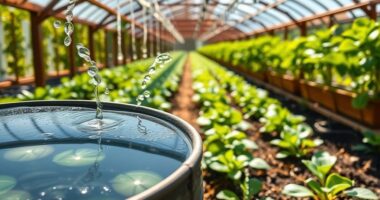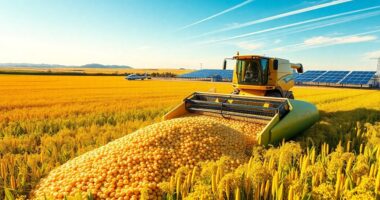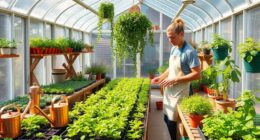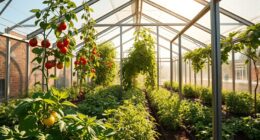Sustainable intensification is key in curbing nitrate leaks while sustaining crops. By integrating practices like crop rotation and conservation agriculture, you can boost yields and protect the environment. This approach not only enhances soil health but also minimizes chemical use, promoting biodiversity. Studies show that farmers adopting these methods see improved productivity and financial returns. Want to discover more about how these strategies can transform farming for the better?
Key Takeaways
- Sustainable intensification practices, like crop rotation, effectively reduce nitrogen runoff, curbing nitrate leaks into water systems.
- Conservation agriculture techniques help maintain soil health while supporting sustained crop yields over time.
- Integrated pest management minimizes chemical inputs, promoting healthier crops and ecosystems.
- Higher crop diversity enhances resilience, leading to improved yields and reduced environmental impacts.
- Community engagement in sustainable practices strengthens food security and promotes social inclusion among farmers.
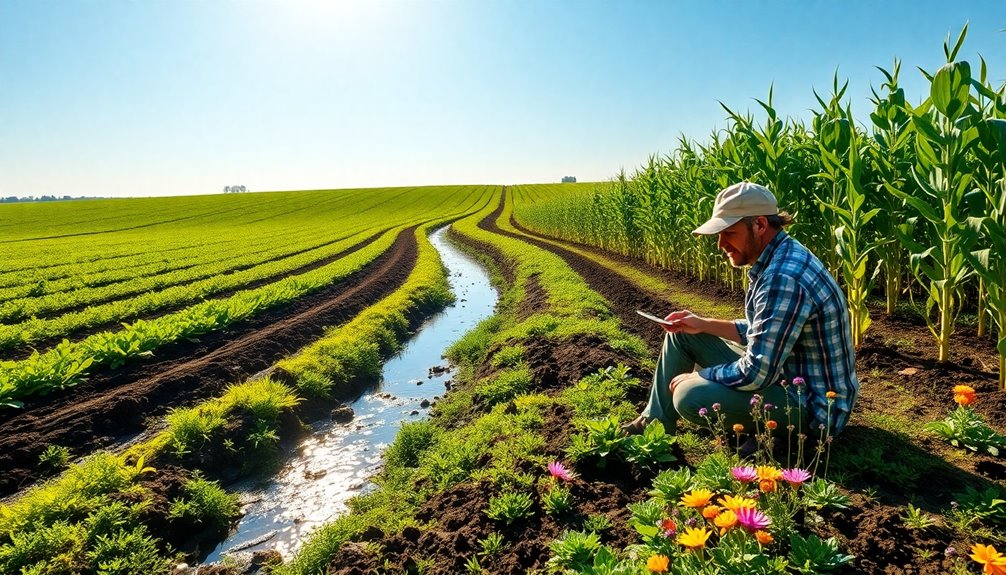
As the world faces increasing challenges in food production and environmental sustainability, sustainable intensification in farming emerges as a vital solution. This approach not only boosts productivity but also enhances environmental outcomes, making it a win-win for farmers and the planet. By focusing on increasing yields while improving social, economic, and environmental sustainability, sustainable intensification is becoming crucial in modern agriculture.
One of the key practices in sustainable intensification is crop diversification. By growing multiple crops, you can increase resilience and yield, which is essential in today's unpredictable climate. Additionally, conservation agriculture, which involves minimal tillage, permanent soil cover, and crop rotation, helps reduce soil degradation, ensuring your land remains fertile for generations. Three-year rotation systems have been shown to significantly reduce nitrogen runoff while maintaining crop yields. Implementing advanced technology in farming practices can further enhance efficiency and sustainability.
Crop diversification and conservation agriculture are vital for enhancing resilience, yield, and soil fertility in today's unpredictable climate.
Integrated pest management further minimizes chemical use, promoting healthier ecosystems and crop health. Adopting these practices can lead to significant benefits, including increased biodiversity, improved ecosystem services, and higher crop yields. In fact, over 12.6 million farmers globally have embraced sustainable intensification methods, proving its effectiveness.
You'll notice that these techniques also enhance soil conservation, improve water management, and contribute to carbon sequestration. From an economic perspective, sustainable intensification can dramatically increase productivity, leading to income growth for farmers. With higher yields and better market prices, you can enjoy improved financial stability.
Plus, reduced reliance on external inputs results in cost savings over time, allowing you to reinvest in your farm. Socially, the benefits are equally compelling. Sustainable intensification increases food security, enhances livelihoods, and fosters social inclusion by involving marginalized groups in agricultural development.
Community engagement is vital, as local participation in sustainable practices strengthens the overall initiative.
Frequently Asked Questions
What Specific Practices Are Involved in Sustainable Intensification?
Sustainable intensification involves several specific practices that enhance productivity while protecting the environment.
You can implement conservation agriculture to minimize soil disturbance, use integrated pest management to reduce chemicals, and diversify crops to promote biodiversity.
Adopting agroforestry can improve ecosystems, while techniques like rainwater harvesting help manage water resources efficiently.
How Do Nitrate Leaks Affect Water Quality?
Oh, who doesn't love a nice swim in a pool of toxic algae?
Nitrate leaks wreak havoc on water quality, turning serene lakes into green soups. They fuel algal blooms that choke aquatic life and create dead zones where nothing thrives.
You wouldn't want that in your drinking water, right? It's a cocktail of health risks, especially for infants.
Can Sustainable Intensification Be Economically Viable for All Farmers?
You might wonder if sustainable intensification can be economically viable for all farmers. The answer's yes!
By adopting low-cost techniques like cover crops, you can reduce input costs while boosting yields. This approach not only improves soil health but also stabilizes incomes against market fluctuations.
With diverse crop rotations and conservation practices, you'll enhance your competitiveness, making sustainable methods a smart choice for both your wallet and the environment.
What Crops Benefit Most From Sustainable Intensification Methods?
When you explore sustainable intensification methods, you'll find that crops like maize, soybeans, and diverse grains benefit significantly.
These practices, including crop rotations and agroforestry, enhance yields while promoting soil health. For instance, maize yields can increase by 10-50% with conservation agriculture.
Additionally, incorporating cover crops not only boosts productivity but also improves moisture retention, making your farming practices more resilient and sustainable in the long run.
How Is Sustainable Intensification Measured in Farm Studies?
In farm studies, you measure sustainable intensification by analyzing crop yields, soil health, and environmental impacts.
You'll look at changes in resource use efficiency, like fertilizer and water consumption. Surveys and field experiments help assess practices like crop rotation and agroecology.
Statistical modeling can reveal relationships between sustainable methods and economic benefits. Additionally, you might evaluate biodiversity and community development indicators to understand the broader effects of these practices on farming systems.
Conclusion
In your quest for a greener future, you'll find that sustainable intensification isn't just a buzzword; it's a game changer. Coincidentally, as you adopt practices that curb nitrate leaks, you'll also notice your crops thriving like never before. It's as if nature rewards your efforts, proving that you can farm efficiently while protecting the environment. By embracing this approach, you're not only cultivating healthier soil but also securing a sustainable future for generations to come.


